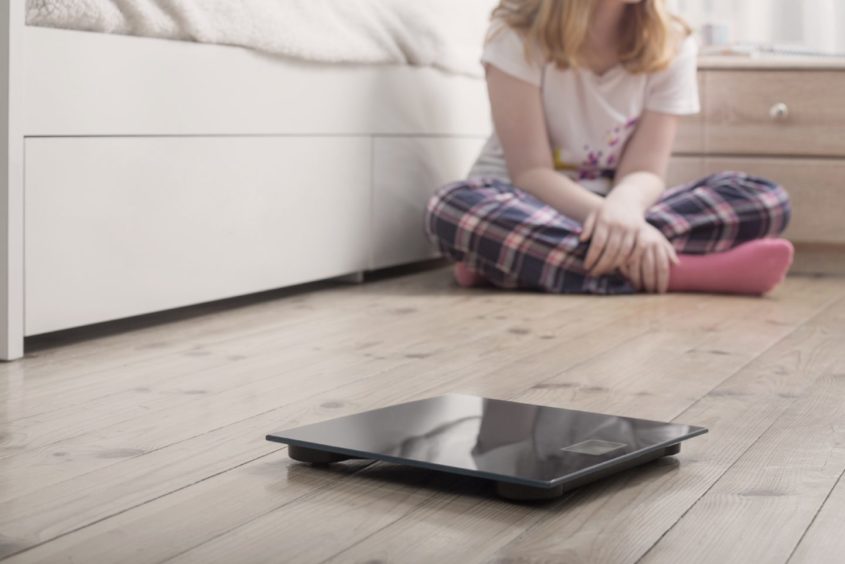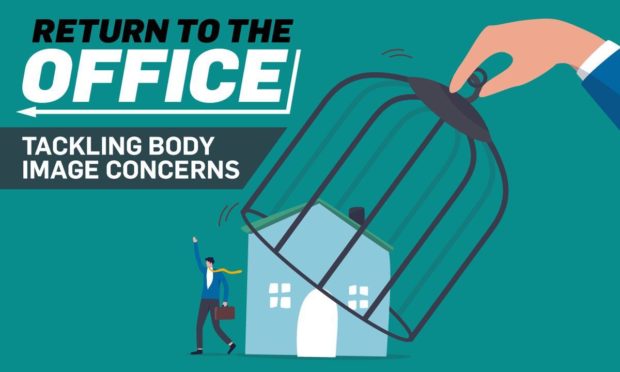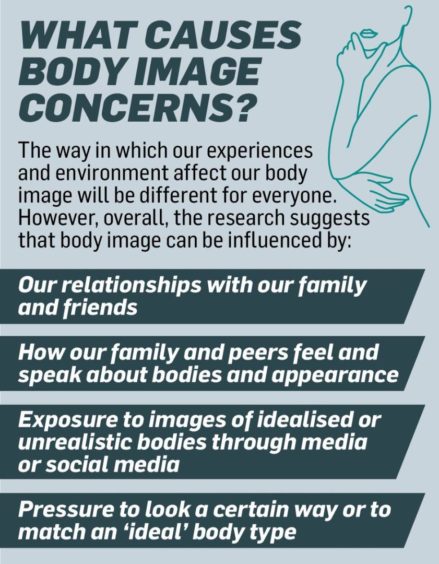With talks of returning to office working more prevalent than before, anxiety over our health related to Covid-19 is a natural reaction – but it might surprise some that we may also have body image concerns.
At the start of the pandemic, health advice encouraged people to use their former commuting time to “lose weight” and “get fit”.
According to Dr Jane Morris, who is a consultant psychiatrist at Royal Cornhill Hospital (RCH) and clinical lead for the north of Scotland’s Managed Clinical Network for Eating Disorders, body image concerns have “really gone up during the pandemic”.
‘Only the tip of the iceberg’
The pressure may exist to many returning to the office or socialising for the first time in more than a year to be muscular or leaner—when the reality is more likely that we have gained weight due to a disruption in our structured routines.
And the stark moment of trying on work clothes after 18 months, and realising they don’t fit, is not an isolated experience, but can be more unsettling for some than others.
The truth is people who have an eating disorder and/or body image concerns might be nervous, not just about regular concerns about returning to the office, but also the “pandemic pounds” talk the first day back.
Dr Morris has said this is only the “tip of the iceberg” of very severe body image-related disorders.
“Most people, particularly females, but males to some extent, are suffering from body image concerns these days.
“So, given the fact that our referral lists have doubled. Not only in the eating disorders clinic, but in the child and adolescent clinics eating disorders referrals have increased.
“Referrals to perinatal psychiatry, where there are young pregnant women or new mothers, and we’re seeing in all those areas body image concerns have really gone up during the pandemic.”
We have spent more than a year curating our image on screen
Technology has been at the forefront, helping us to work from home and stay connected.
However, Dr Morris said people were having to present their bodies in a new way and “scrutinising” themselves on Zoom calls and virtual spaces.
“People were saying how difficult it was to actually constantly have to come up against their body image on a screen.
“And if that wasn’t bad enough, now we’ve got the opposite, which is that people have probably managed to learn how to curate their body image on screen, or to use an avatar, or to just focus on their face.
“But, suddenly now, we have to go back out into the public.”
However, it’s also been highlighted people with severe anorexia may have lost further weight, due to it going unchecked throughout lockdown.
In a previous interview with us, Dr Morris said she believed that restrictions enabled people with eating disorders to continue to lose weight, without family and friends noticing.
We’re working with #eatingdisorder clinicians on guidance following the #CoronavirusOutbreak and will update our site as soon as possible.
We’re also putting together distraction techniques for those facing disruptions – what do you do to cope with triggering emotions? pic.twitter.com/jnQqTvQlhB
— Beat (@beatED) March 16, 2020
“But most people have actually gained weight, partly because exercise hasn’t been as structured, but also because of the increase in drinking,” she said.
“We know for a fact that people have been drinking more, and alcohol contains calories, and it also relaxes people’s sense of discipline over how much they’re going to eat or exercise.”
It’s linked to our social anxiety
“The fact is that probably most of us will have gained a little weight,” she explained.
“But it’s not just a matter of whether we’ve gained weight or not it’s, it’s the fact that it’s linked with our social anxiety.”
Dr Morris said it’s easy for us to think the reason we’re worried about going back to the office, is because everyone will be looking at us and thinking how we’ve gained weight.
“Once you’ve got some body image concerns, it’s so easy to blame one’s body image for all the other things that are going on.
“And it’s a pity to do that. If we can try and be very honest with ourselves, and actually think ‘well, am I really nervous about other things and am I just hiding in my body image?’.”
We have to be careful not to over-respond
We have to be very careful that we don’t “over-respond” to the change in our weight gain.
Dr Morris gave the example of going on a crash diet, where one’s appetite would ultimately “revolt” and end up binge eating, or exercising compulsively at the gym where they could end up hurt.
She added: ” I could actually give myself an eating disorder just by overreacting to the fact that I’ve gained weight, and I was a bit embarrassed about it.
“And the other thing that I could do is, instead of going out and buying nice, smart office clothes in a larger size, I could try and squeeze myself into the old one and tell myself that I would slim into them.
“My single piece of advice for people who’ve got body image worries would be to say: ‘Go out and treat yourself to some really nice, smart, new clothes that make you feel and look good.

“And make sure they’re in a size that is comfortable and fits. That way you won’t constantly be giving yourself the message that you’re fat and uncomfortable.”
My single piece of advice for people who’ve got body image worries would be to say: ‘Go out and treat yourself to some really nice, smart, new clothes that make you feel and look good.
She also recommended treating yourself to things that aren’t related to size and weight, like makeup, hair and varnish.
Stop making personal comments about appearances
At work, tackling the conversation of appearance and weight can be a daunting one.
Dr Morris said: “Generally, we need to stop making personal comments about each other’s appearances.
“When we meet people again, it’s often very, very tempting to say, ‘Oh, you look wonderful’ or ‘you look well’.
“People who’ve got body image sensitivities probably don’t need to have their attention directed to how they look.
“So, unless you say something like you know what a lovely shade of pink or your fingernails are just glorious or something, I think it’s better to try and stay off appearance-related comments.”

Dr Morris added it’s just as important to talk about your own weight in “obsessive ways”.
She said: “When people go into work, if they personally have gained weight, or not gained weight – if somebody starts a conversation about ‘Oh, I have gained so much weight’ – it’s probably better not to join it.”
Having the ability to say the conversation of weight makes you uncomfortable, is a good idea and change the topic of conversation to something other than that.
Challenge yourself to get out
Above all, Dr Morris said people fight the urge to avoid leaving the house and hiding away.
“It’s really important not to avoid,” she added.
“There will be some people who are anxious, either socially anxious or body image anxious, that they want very much to make excuses to not go back into the office.
“For some people it is terrifying. The longer we avoid, the worse problem gets.
“If people have been hiding away their appearance, the best thing they can do is go out and practice. And if going straight into the office is too much, then start by walking around the local area – perhaps go into shops, arrange to meet a friend.
“Because this has been a long time, and some people have been hiding away. It’s bad enough that people’s body image is building up into a phobia over 18 months – let’s not make it two years or more.
“It’s very tempting to hide, but I think people need to challenge themselves.”
For anyone struggling with the issues raised in this piece, eating disorder charity Beat’s helpline is available 365 days a year on 0808 801 0677.


